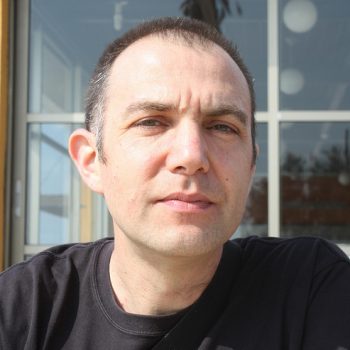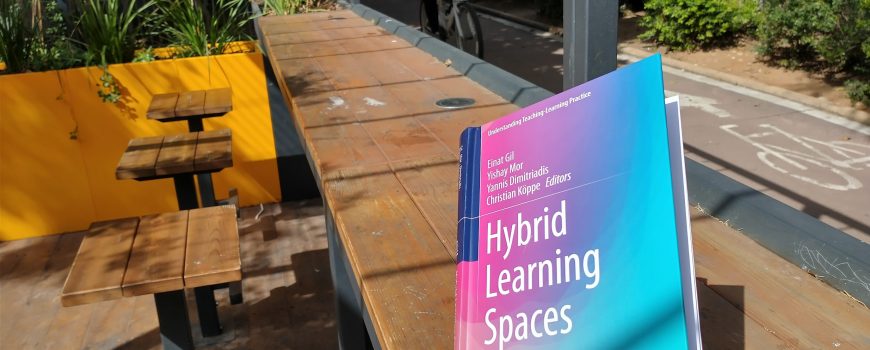
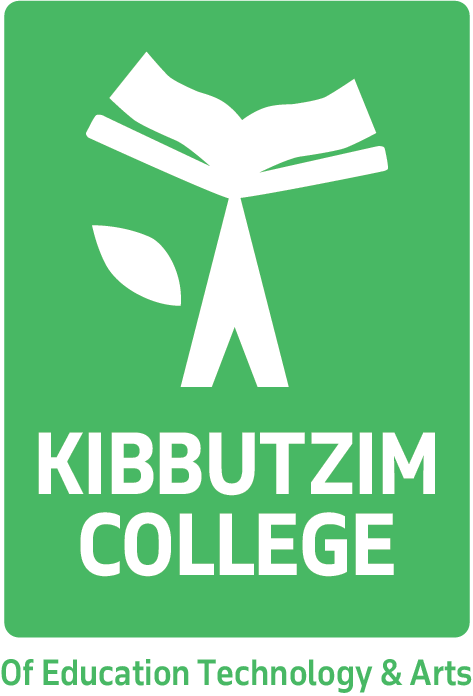 |
מכללת סמינר הקיבוצים ומיט״ל מזמינים אתכם להשקת ספר חדש בנושא ״מרחבי למידה היברידיים״. האירוע עצמו יתקיים במתכונת היברידית – במכללה ומקוון. |
זום למצטרפים מרחוק: Zoom link for remote participants: https://us02web.zoom.us/s/87438096164
מרחבי למידה היברידיים הפכו בשנתיים האחרונות למרכיב משמעותי בנוף החינוכי.
ספר חדש, בהוצאת ספרינגר, ובעריכת עינת גיל, ישי מור, יאניס דימיטריאדיס וקריסטיאן קופ, בוחן את האתגרים וההבטחות שבמרחבים אלו מנקודות מבט פדגוגיות, אדריכליות וטכנולוגית, ובמשקפיים תיאורטיות, מעשיות ועיצובית.
Hybrid learning spaces have become a significant component of the educational landscape in the last two years. A new book, published by Springer, and edited by Einat Gil, Yishay Mor, Yannis Dimitriadis and Christian Köppe, examines the challenges and promises in these spaces from pedagogical, architectural, technological and design perspectives.
Agenda
|
Welcome and Opening Remarks |
|
|
|
Prof. Yehudit Weinberger, Rector, Kibbutzim College of Education, Technology & the Arts Mr. Eli Shmueli, Director, Meital – the Israeli Inter-University Centre for e-Learning |
|
Keynote |
|
|
|
Professor Alejandro Armellini, University of Portsmouth: Designing for active blended learning and teaching in hybrid spaces The earlier embedding of student-centred approaches into learning and teaching, co-creation and institutional capacity building were key to the transition to emergency remote teaching across the global HE sector from March 2020. In this session, Ale will reflect on how pedagogic transformation normalised before Covid-19 influenced the way institutions and their students operated during the pandemic. Drawing from his work at the University of Northampton between 2012 and 2020, and at the University of Portsmouth since 2020, he will explore what this preparedness involved, including creative and sometimes radical approaches. He will introduce Portsmouth's Digital Success Plan for Learning and Teaching, as the university embarked on the redesign of its portfolio for post-pandemic active blended learning in hybrid settings. |
|
Alejandro (Ale) Armellini is Professor and Dean of Digital and Distributed Learning at the University of Portsmouth in the United Kingdom. His key role is to provide leadership in digital learning and learning innovation. Before joining Portsmouth, Ale was Dean of Learning and Teaching at the University of Northampton, where he was the strategic lead for the redesign of all programmes for active blended learning. Ale is a Principal Fellow of the Higher Education Academy and Fellow of the Royal Society for the Encouragement of Arts, Manufactures and Commerce. Ale’s research and doctoral supervision focus on learning innovation, blended and online pedagogy, institutional capacity building and open practices. He holds visiting professorships at several UK and overseas universities. |
|
|
Lightning talks |
|
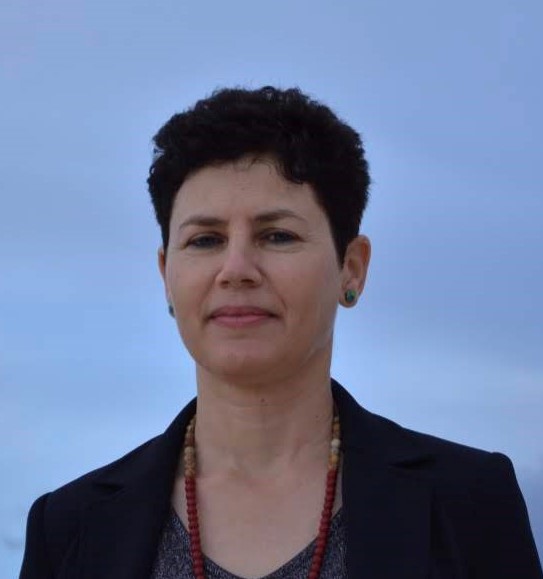 |
Dr. Einat Gil, Kibbutzim College of Education, Technology & the Arts: A Three-fold perspective of hybrid learning spaces Hybrid learning has become increasingly prevalent in the discourse of academic institutions and educational systems. The term has acquired numerous interpretations although it generally refers to different spaces of learning. The presentation introduces a three-fold evolving perspective of hybrid learning spaces from the first book chapter. It starts by focusing on historical roots and current meanings, presenting hybrid as blended. It then moves to Hybrid as a space of merging interactions, where connected mobile technology enters the space and adds to its dynamic. Last, we consider hybrid as fluid, to reflect a compound-like space where the boundaries of formal dichotomies are blurred and learner motivation takes a center stage. |
|
|
Dr. Tim Fawns, University of Edinburgh: H2m Pedagogy: Designing for Hybrid Learning in Medical Education In May 2020, the University of Edinburgh announced the September launch of a hybrid model for all on-campus programmes. Teaching would be neither fully online nor fully on-campus, but able to take place in either or both modalities (e.g. remote and on-campus students learning together), and change location without major disruption to its design. In medicine, where learning practical skills through engagement in complex practice is crucial, there were significant pedagogical challenges. I discuss our approach to helping lecturers in medical education design for hybrid learning in a 2-metre world (i.e. where physical distancing requires a 2-metre separation between people) or “H2m”. |
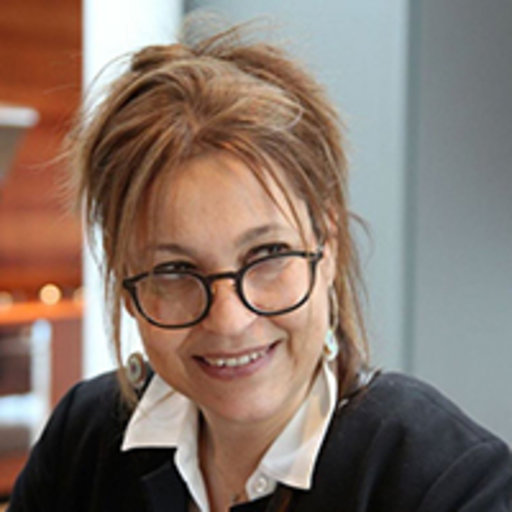 |
Dr. Anat Mor-Avi, Illinois Institute of Technology: Space WE-Q – Intelligent Space for Collaborative Creativity in Learning-driven Environments Through a glimpse from a dissertation connecting education and architecture, the idea "Design and space do matter" in supporting innovation and a culture of a place in learning-driven domains’ will be discussed. Evidence indicates that collaborative creativity is essential for innovation, and creativity flourishes in contradictory patterns of settings and behaviours. This lecture introduces a study investigating hybrid spatial patterns supporting a collaborative culture with participatory creativity. The research studied how an active, adaptive design approach might emerge as support for paradigm shifts relative to the learning and creative processes. It further aims to present a relationship between learning, creativity, and space by introducing hybrid patterns of architectural affordances that may promote new learning behaviours and positive emotions impacting collaborative creativity. |
 |
Professor Yannis Dimitriadis, University of Valladolid and Dr. Yishay Mor, Meital: Practical predictions for hybrid learning spaces The chapters of this book provide a broad and deep perspective of the state of Hybrid Learning Spaces (HLS) and the emerging ethical, pedagogical, administrative, architectural and technological issues. Nevertheless – many readers might find themselves wondering what the concrete implications of these insights are, in the short, medium and long term. In an attempt to answer this question, we have conducted a rapid quasi-Delphi study among the authors of the various chapters. We will present key insights emerging from this study. |
| Panel Discussion | |
| Book editors, chapter authors and guests will discuss key questions emerging from the book. | |
About the Book אודות הספר
נדמה שהדואליות של מרחבי למידה פיזיים ווירטואליים כבר הפכה למאפיין קבוע של הנוף החינוכי שלנו, אולם, אולי הגיע הזמן להתחיל לפקפק בתקפותה. האם זו באמת דיכוטומיה, או שמא רצף? האם הציר הפיסי-וירטואלי צריך להיות המימד העיקרי שסביבו אנו מקבצים חוויות חינוכיות? כיצד הוא מצטלב ומתקשר עם צירים אחרים, כגון פורמלי-בלתי פורמלי, תעסוקתי-פנאי, פתוח-סגור, מורה-תלמיד?כיצד אנו מתאימים, כמורים, לומדים, מעצבים, קובעי מדיניות, לנוף המשתנה הזה? כיצד נעצב אותו כך שיציע חווית למידה מיטבית?
שאלות כאלה הובילו אותנו לערוך סדרה של אירועים אקדמיים ומקצועיים בנושא של מרחבי למידה היברידיים (HLS) – מרחבים המאתגרים את הדיכוטומיות לעיל.
ספר ערוך זה אוסף כמה מהתוצרים של המאמץ הזה, ומציע גישה רב-קולית ובינתחומית להיברידיות בחינוך. הוא מחבר בין דוגמאות מעשיות, הנחיות עיצוב וניתוח תיאורטי, המשלב נקודות מבט ממחקר ופיתוח טכנולוגי, תיאוריה ופרקטיקה חינוכית, ארכיטקטורה ועיצוב חלל ומוצר. ספר זה פונה לחוקרים, פרקטיקאיים, יזמים וקובעי מדיניות בתחום החינוך, הטכנולוגיה והעיצוב, ומציע נקודות מבט מגוונות ולאחר מכן מזקק תובנות מעשיות בצורה של עקרונות ודפוסים עיצוביים, מודלים פדגוגיים ותחזיות של מגמות עתידיות.
As we have come to accept the duality of physical and virtual learning spaces as a permanent feature of our educational landscape, we begin to question its validity. Is this really a dichotomy, or is it a continuum? Should this be the primary dimension around which we cluster educational experiences – how does it intersect and interact with other axes, such as formal-informal, vocational-recreational, open-closed, teacher-student? How do we adapt, as teachers, learners, designers, policy makers, to this changing landscape? How do we shape it to offer an optimal learning experience? Such questions led us to conduct a series of academic and professional events on the theme of Hybrid Learning Spaces (HLS) – spaces which challenge and defy the dichotomies above. This edited book collates some of the products of that endeavor, offering a multi-vocal, interdisciplinary approach to hybridity in education. It connects practical examples, design directives and theoretical analysis, combining perspectives from technology research and development, educational theory and practice, architecture and space and product design. This book addresses researchers, practitioners, innovators and policy makers in education, technology and design, offering broad perspectives and then distilling practical insights in the form of design principles and patterns, pedagogical models, and predictions of future trends.

The event will take place at the new Center for Innovation & Learning Design, Kibbutzim College of Education, Technology & the Arts




